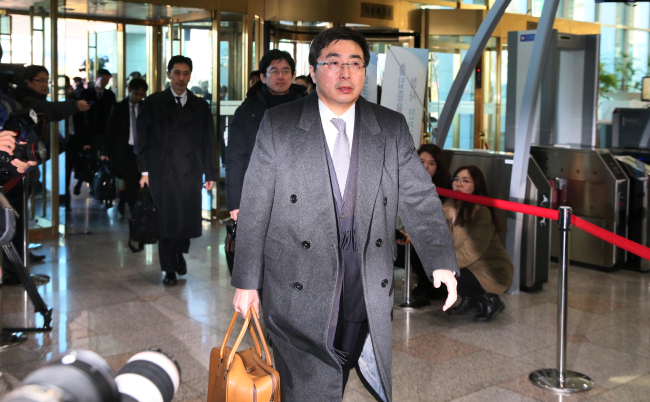Seoul and Tokyo are inching toward a compromise on Japan’s wartime sexual enslavement of Korean women by holding a director-general-level meeting on Sunday, a day before the ministers were set to sit down for talks.
 |
| Japese Foreign Ministry`s Director-General of the Asian and Oceanian Affairs Bureau Kimihiro Ishikane walks into the building of Seoul`s Foreign Ministry on Sunday. (Yonhap) |
The 12th round of working-level talks were held for two hours to settle one of the thorniest issues that has long frayed the bilateral ties to the detriment of their practical cooperation, particularly over deterrence against North Korea.
The latest talks raised hopes for a breakthrough as the two sides were seen accelerating their negotiation schedule. But tension also remained high with Japanese news reports speculating on the contents of the agreement and Seoul rebuking them as being “groundless,” questioning Tokyo’s sincerity in its efforts.
Seoul’s Foreign Minister Yun Byung-se on Sunday reiterated Seoul’s hitherto position over the issue remains unchanged and that he would put “utmost efforts” to reflect Seoul’s position when he meets his Japanese counterpart Fumio Kishida on Monday.
The efforts to settle the “comfort women” issue have gained momentum since Korean President Park Geun-hye and her Japanese counterpart Shinzo Abe agreed to accelerate the negotiations during their first-ever summit in Seoul last month.
Japan has long maintained the issue was already settled under a 1965 treaty normalizing bilateral ties. Article II of the treaty states the problem concerning property, rights and interests of the two contracting parties and their nationals has been settled “completely and finally.”
But Seoul has claimed that the issue was not on the agenda for the negotiations over the treaty at the time, given that it was only in the 1990s that victims started to raise the issue. It also claims it is a wartime human rights issue that should be dealt with separately.
A recent set of developments has created a fresh momentum for bilateral efforts to settle the issue.
Last Wednesday, Korea’s Constitutional Court refused to review a petition over the constitutionality of the 1965 treaty that normalized ties between South Korea and Japan. On Dec. 17, a Seoul court cleared a Japanese reporter of defaming President Park by reporting rumors about her whereabouts during a deadly ferry disaster last year.
But there were a slew of Japanese reports on the ministerial talks, with one of them saying that Seoul is considering relocating the statue of a Korean comfort woman in front of the Japanese Embassy if Tokyo makes a satisfying offer. The report said the alternative location could be a park on Mount Namsan in Seoul.
Other news reports said that Tokyo is considering the option of Abe writing a letter of apology to Korean victims and creating a fund — worth 100 million yen ($830,909) — to support them.
The Seoul government expressed “strong regrets” over the news reports, with director general Lee calling in a senior official from the Japanese Embassy in Seoul to lodge a protest.
“There continue to be preposterous reports from Japan even when the ministerial talks have yet to be held and nothing has been decided,” ministry spokesperson Cho June-Hyuck told reporters on Saturday.
“We cannot help but have strong doubts about Japan’s intentions and whether Tokyo will respond to the talks with a sincere attitude.”
Even if the two sides reach an agreement, it remains to be seen whether the victims and civil society welcome the decision.
The Korean Council for the Women Drafted for Military Sexual Slavery by Japan — a leading civic group calling for Japan’s apology and compensation for the colonial-era atrocities — vowed against any move to remove the comfort women statue.
“It is impossible to remove or relocate the statue as it has become a symbolic presence for us all, which we, the council, cannot arbitrarily tamper with,” Yun Mi-hyang, head of the council, said in a statement.
“When our civil society was not informed of what was discussed between Seoul and Tokyo, all these reports came out in the Japanese media. If the reports are true, this would divide public opinion (in Korea).”
The council also demanded that Tokyo should make an official apology, offer adequate compensation to the victims, include the wartime atrocities in school education and carry out projects to honor the spirits of the victims.
By Song Sang-ho (sshluck@heraldcorp.com)

